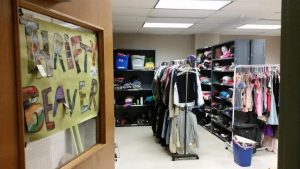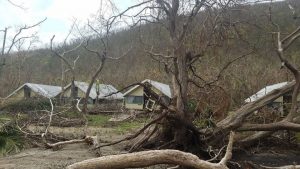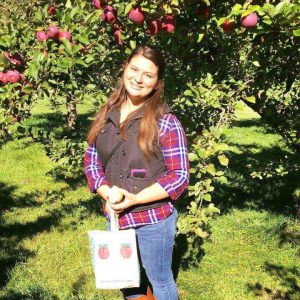
Dec 8, 2017 | Exclusive |
By Leah Boucher –Staff Reporter
The UMF Track Club has recently grown to over 30 athletes, creating a challenge for its Executive Board to strictly adhere to the $4,200 budget given for the winter semester. With the first meet of the season on December 9th, the team faces the stress of funding before they begin to compete.
Instead of coaches taking on the responsibility of the club, students on the E-board are in control of finding transportation, lodging, and calculating the costs of each meet while trying to stay under budget. Ben Toribio, President of the club, knows that the increase in team size this semester will force them to make some changes in order to stay within their funds.

Senior Jesse Enos and UMF Alum Sean Cabaniss compete in an indoor track meet in 2016.
credit: Jesse Enos
“During the last indoor track season, we had around 20 athletes, allowing us to take school vans or local buses to meets,” said Toribio. “However, now that we are pushing 30 members, we need to look for other ways to transport the entire team without spending thousands of dollars on a coach bus.”
Jesse Enos, Vice President of the club, has the job of finding out what, how, and when the team will spend the money, forcing him and Toribio to make the decision to cancel the original first meet on December 2nd.
“To my knowledge, I don’t think the budget has changed drastically since last year, but more members means more equipment, gear, and entrance fees,” said Enos. “Plus, after looking for a coach bus to Smith College for two days, it would have put us out of $3,500, which made it fiscally irresponsible to attend that meet with our budget in mind.”
Kirsten Corey, Secretary of the Track Club, is sticking with a positive outlook on the season due to team growth. “When looking at our overall team goals for the winter semester, I do not expect that our limited budget will interfere with reaching them, as more members give us a stronger team,” said Corey. “Ultimately, our goals for indoor are to train and prepare for the NAC championship meet in the outdoor season, so even if we have a meet or two canceled, we can still prepare just as hard in practices.”
Enos believes that if the indoor club was instead a varsity sport, they may have more money to work with to attend meets in Massachusetts and other states in New England.
“Right now, it’s disappointing that we can’t attend more meets in various states, as this gives us more competition to work with and build from,” he said. “If we were a varsity sport, our funding would come from tuition, but as a club, most of our money comes from the activity fee that all students pay as well as any fundraising we take on, limiting our choice in meets in connection with their distance from UMF.”
Although the team will compete in Maine for the majority of their meets, Corey doesn’t want this to discourage new members. “Most of our new athletes are freshman, and they have a lot of potential and put a lot of work into each practice,” she said. “As a team, we need to support them and stress the importance of their talents and efforts.”

Dec 8, 2017 | News |
By Leah Boucher – Staff Reporter
UMF’s honor society Alpha Lambda Delta donated Thanksgiving baskets to ten families with children who attend the W.G. Mallett School in an effort to combat local hunger. Families in financial need were provided with food for a full Thanksgiving meal to cook and eat together during the holiday season.
Sarah Jenkins, Secretary of Alpha Lambda Delta (ALD), worked this year as the Thanksgiving Drive Coordinator. Her responsibilities consisted of contacting the school to arrange this drive, finding the number of families in need, and ultimately getting donations for a successful drive.

Sarah Jenkins, Kayla Tremblay, and Morgan Leso stand in front of several Thanksgiving baskets donated to families in the Farmington area.
Photo credit: Leah Boucher
Kayla Tremblay, President of ALD, worked with Jenkins to set a goal of raising $300 this semester for the baskets. “This is the third year we have organized this drive, and in past years, we have asked for donations of canned goods or for businesses to create Thanksgiving baskets themselves,” said Tremblay. “Because this year’s need rose to making ten baskets, we chose to ask for donations in the form of money. That way ALD members could go shopping together to make sure all baskets had the exact same items.”
Baskets consisted of cranberry sauce, corn, green beans, carrots, broccoli, sweet potatoes, a bag of potatoes, gravy, mixes for 3 different pies, pie crusts, a loaf of bread and a gift card to purchase a turkey for each family.
“Last year, we donated five baskets to families, and I reached out to car dealerships to donate,” said Jenkins. “As a representative on the Student-Athlete Advisory Committee (SAAC) for cross country and track, I brought up the idea of partnering with ALD, as the committee wanted to participate in a service project, and this encouraged ALD to look for donations solely within the UMF community this year.”
Not only did Jenkins encourage SAAC, who raised over $180, to donate, but she challenged other UMF clubs to raise money as well. “We worked with the Association for the Education of Young Children and Bust-A-Move Beavers to raise even more money,” she said, “and from our collaboration efforts, we reached our goal and ended up buying more food than we had originally budgeted for.”
Morgan Leso, Mallett’s guidance counselor who worked with Jenkins to make a final decision on the number of families in need, is grateful for the support ALD annually provides in trying to combat student and family hunger, an effort that Mallett School itself works on year round.
“Within the past several years, Mallett has opened a food pantry, which is funded through grant money and is open once a month,” said Leso. “However, around the holidays and the winter season, the need for more food rises, and we look for any outside donations we can get, which is what makes ALD’s donations in the form of complete Thanksgiving meals more helpful than ever.”
Tremblay, Jenkins and other ALD members bought the food at Walmart and Hannaford the week of Thanksgiving and dropped the baskets off directly at Mallett School, making it possible for families to pick them up or have the food brought to them by Leso. “There are some families who lack transportation to pick up the meals at the school, and in those cases, I just drop the baskets off at their homes to make sure they can still enjoy a meal with their loved ones,” said Leso. “A lack of transportation or food does not mean people should be denied an enjoyable Thanksgiving holiday.”

Nov 18, 2017 | Exclusive |
By Leah Boucher – Staff Reporter
UMF’s Thrifty Beaver Cooperative has recently completed changes in the location and services they offer in an effort to help hungry students and those who need new clothing for the winter.

The Thrify Beaver Co-op is now located in the basement of the Fusion Center. (Photo Courtesy of Danica Lamontagne)
Now located in the basement of the new Fusion Center building, students can receive any food in the food pantry for free and can participate in a clothing swap, where the number of clothes they bring in to donate is the number of clothes they can take from the store in return.
Originally developed by the UMF Sustainable Campus Coalition (SCC), Thrifty Beaver expanded in the past year from a simple thrift store on the third floor of Merrill to a thrift store and food pantry in a more central campus location near the Olsen Student Center. Luke Kellett, UMF Sustainability Coordinator and Assistant Professor of Anthropology, hopes that this change will allow students to feel more comfortable if they are in need of food or clothes.
“We intentionally combined the food pantry with the campus thrift store to reduce the stigma of accessing a food pantry,” said Kellett. “We are now one of over 400 university/college food pantries in the US, so this is a rapidly growing trend which shows that higher education is taking food insecurity and hunger seriously, an issue which has generally seen very little attention up until the last few years.”
As this semester winds down and students run out of meals on campus, this co-op hopes to provide frozen meals for students in need with a new refrigerator/freezer they received due to a grant.
“Foods like frozen burritos, pizza pockets, and so on will be available for students to eat right away or store in their own refrigerators in their rooms or off campus,” said Kellett. “Not only will the food pantry have an increase of meals for the cold season, but Thrifty Beaver also sees an increase in the amount of clothes donated right before and during the winter months.”
Danica Lamontagne, a senior double majoring in Environmental Policy and Planning and Political Science, is a Thrifty Beaver student worker who is aware of the rising issue of student hunger and need for warm clothes. “It’s sometimes hard for students to access local food pantries or clothing swaps, and they might feel ashamed visiting one of those facilities,” said Lamontagne. “Thrifty Beaver tries to normalize itself as a comfortable, local resource to be a part of; student hunger and students with lack of appropriate winter clothing is a serious issue not only on campus but in this country.”
Kelly Toomey, a junior Secondary Education and Environmental Science major and student leader of the SCC, is trying to publicize the services offered within Thrifty Beaver and increase student interest.
“At the beginning of November, we partnered with Johnson Scholars. They handed out cookies in the student center with a free coupon to Thrifty Beaver, a map of how to get there, and a chance to enter a raffle to win a Narrow Gauge Cinemas movie pass or a Hannaford gift card,” said Toomey. “We also have new signs in the front and back of the Fusion Center and maintain a website and Facebook page for those who want to know more about what we offer.”
Kellett believes that there will be more student interest and involvement, as foot traffic will increase when the Fusion Center is finally completed. However, he knows time is needed for any type of major increase in the number of student visitors.
“I have talked to other universities who have food pantries, thrift stores, or similar co-ops such as Thrifty Beaver. They have all informed me that it takes time for new services to be accessed,” he said. “That means we need to be patient yet engaged in keeping the co-op visible and active on campus.”
The Thrifty Beaver Co-op is located in room 004 in the basement of the Fusion Center and is open Sunday, Monday, and Thursday from 3-8.

Oct 27, 2017 | News |
By Leah Boucher – Staff Reporter
Nancy Prentiss, UMF Lecturer in Biology, has announced that the Tropical Island Ecology Course for May of 2018 will no longer take place, due to the devastation from Hurricanes Maria and Irma.
Prentiss was in the middle of planning the 13th annual trip to the island of St. John when the hurricanes hit. She knew that the trip was not possible after hearing that there had been total destruction of roads and homes throughout the Virgin Islands, but especially on St. John, where structures that had been around for hundreds of years were in complete ruins. The two hurricanes that swept through St. John left the entire island without electricity, which will likely not be restored for several months.

VIERS, although not completely destroyed, sustained damage from Hurricanes Maria and Irma.
(Photo courtesy of The Virgin Islands Environmental Research Station Facebook Page)
The Virgin Islands Environmental Resource Station (VIERS), where past UMF students have stayed for the entire 10 days on the trip, was affected by the hurricanes but still left standing.
“At VIERS, the roofs are still on the buildings, but all of the buildings got knocked off their posts,” said Prentiss. “It is likely that a high wall of water actually pushed the cabins off their posts.”
Michaela Wright, a sophomore Elementary Education major who took this course in May of 2017, distinctly remembered what initially drew her on this trip.
“When I first saw pictures of the island on a slideshow Nancy showed to students who were interested in the trip, I fell in love with the landscape and the beautiful coral reefs,” said Wright. “It’s difficult to think that the places I once visited around St. John are extremely damaged or completely destroyed.”
Ron Butler, UMF Professor of Biology and the other professor who teaches this ecology course, is hoping that despite all this damage in the Virgin Islands, VIERS will be back up and running by 2019 for another trip to take place.
“For me, St. John has a unique magic,” said Butler. “It’s hard for me to imagine finding an alternative site that would offer all of the learning opportunities for UMF students that are available in the Virgin Islands National Park, where VIERS is located.”
Although the general infrastructure of the island has been destroyed, nature on St. John has been resilient. “After the two hurricanes went through, the island was completely brown and dead looking,” said Prentiss. “Every leaf was gone, but now leaves are already coming back, and the two days of heavy rain from Hurricane Maria provided water for parched, dry land, slowly making the island look green again.”
Butler is aware that time is needed to help the island recover. He knows that more attention needs to be given to the St. John natives whose lives have been intensely altered from the two natural disasters.
“The island’s ecology will recover, but there are people who have lost their homes, their livelihoods, and in some cases – their lives.” said Butler. “With the devastation in Texas, Puerto Rico, Florida, and California, coupled with the tragedy in Las Vegas, the plight of people in the US Virgin Islands has essentially disappeared off the nation’s radar–we tend to forget that those people are American citizens, too.”
One major way people can help with recovery efforts is by directly donating money; St. John Rescue is one reputable organization on the island, where 100% of the funds go directly to helping the locals begin to recover. Prentiss believes that sending money is better than trying to go down and help right now.
“If you go down to the Virgin Islands, you become another person who needs food and water and a place to stay,” she said. “Local people may not have a place to go home to, but they are beginning to get their basic needs met.”
To donate to St. John Rescue, visit their website at www.stjohnrescue.com/donate

Oct 27, 2017 | Feature |
By Leah Boucher -Staff Reporter
The sun shone on a Friday morning through the basement windows of Dakin into the dance studio, where red and dark blue costumes reflected their sparkles onto the walls. Three mirrors placed together on the front wall captured a choreographer in leggings and a comfy green sweatshirt mouthing the count of the music while the floor vibrated with the bass of hip-hop music.
Kayla Tremblay, the dancer in front of these mirrors, can be found here for at least a half an hour each Sunday through Friday dancing in eight different routines for Bust-A-Move Beavers (BAM), the dance club on campus she has been a member of since the first semester of her freshman year.

Kayla Trembley, senior Elementary Education Major at UMF
(Photo courtesy of Kayla Trembley)
Tremblay, a senior Elementary Education major, smiled and leaned back on the wall filled with old dance showcase posters from the 90’s as she thought back to her previous years of dance. “This will be my 19th year of dance, and I started dancing at Steppin’ Out Dance Centre in Saco, Maine, at the age of three,” said Tremblay. “It has always been a way for me to let my stress from work and school out.”
Her motivation to continue dance past high school even led her to participate in a clogging competition with Danica Lamontagne, another BAM member, this past spring, where they placed first. “This was the first competition that I signed up to do without being part of a competition team,” said Tremblay, “and being able to make the choice by myself was a big step of independence and confidence for me.”
This stress relief activity is helpful now more than ever, as Tremblay has been a member of BAM, Rotaract, the Rugby Team, French Club and chair of the Spring Fling committee, as well as Alpha Lambda Delta, in which she holds the position of President. She also just finished mailing out cards for “Brocktober” at UMF, where people write and decorate Halloween cards for a terminally ill boy named Brock in Biddeford. Her natural leadership abilities led her to organize this event all on her own while encouraging the clubs she is a part of to contribute, as well.
“When I first heard about Brock, I knew I wanted to get involved,” said Tremblay. “I knew if I reached out to other UMF clubs and organizations, they could help to make this event bigger than just myself writing several cards to him.”
Tremblay wiped off her forehead as if to get rid of the sweat from just thinking about her hectic daily schedule. “I work about 15 hours a week in the Partnership for Civic Advancement office, and with a full load of classes, plus all my clubs, sometimes I am forced to eat dinner on the run or do my homework in 15-minute increments,” said Tremblay.
Reflecting back on her four years in BAM, Tremblay’s face became solemn, but she then quickly switched back to her usual radiant grin. “It’s bittersweet knowing that I’m leaving such a supportive group when I graduate this May,” she said. “Everyone is willing to block out everything else that they may have going on to be an active part of rehearsal, but if someone does need support, there’s 41 other people to listen and help–it’s the perfect family network to be a part of.”





